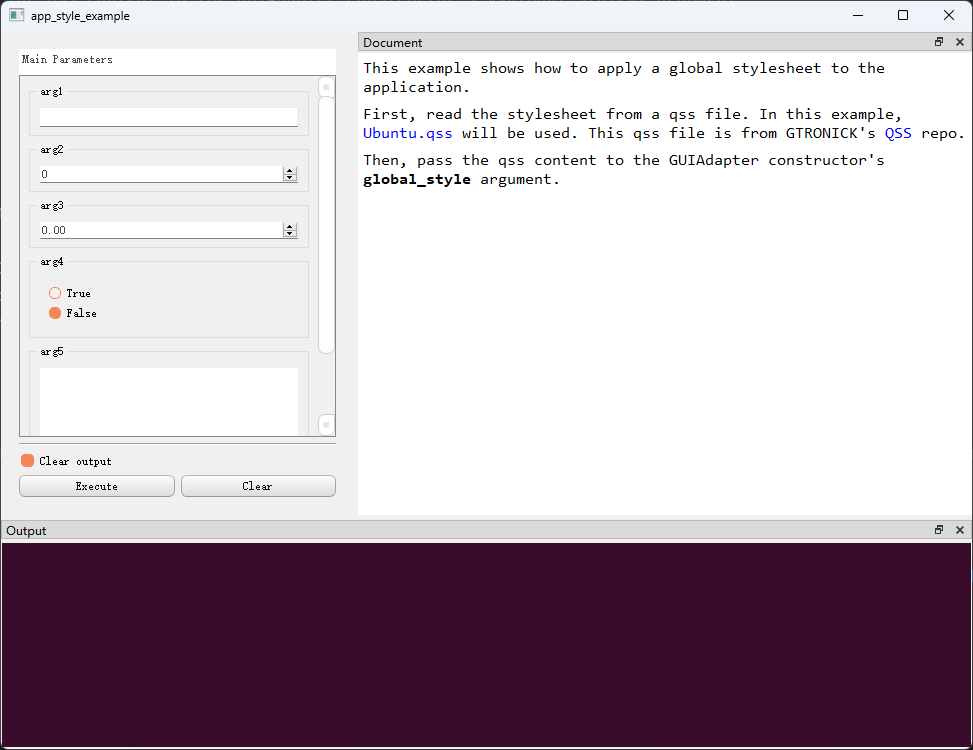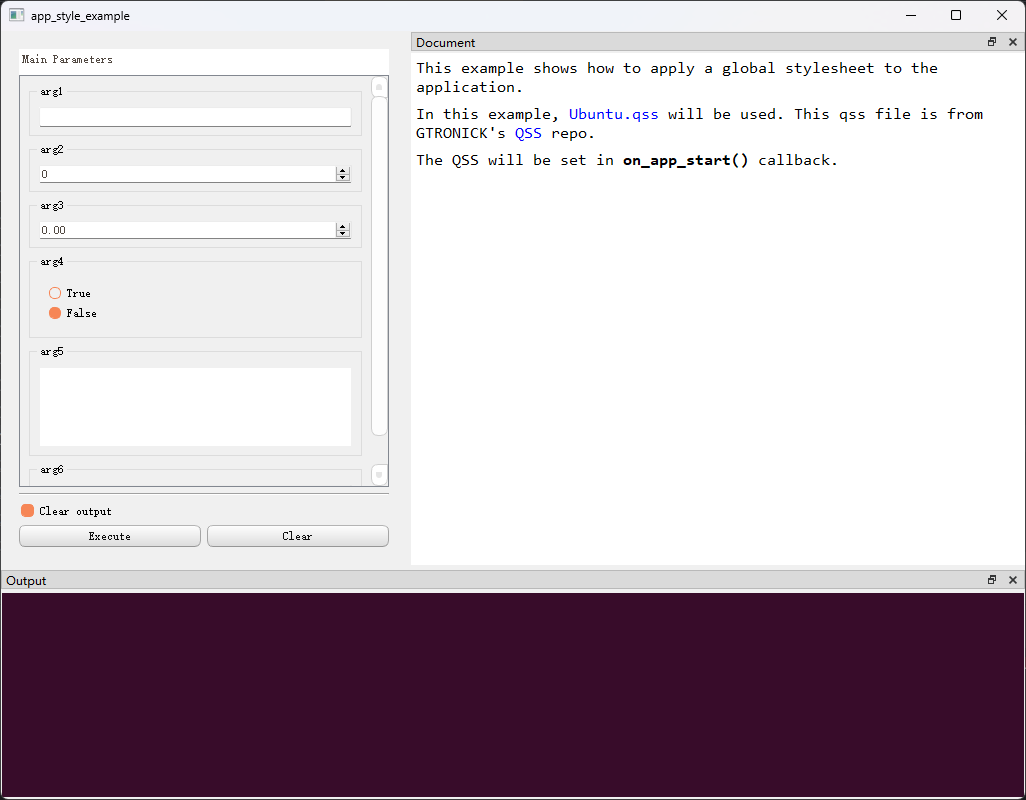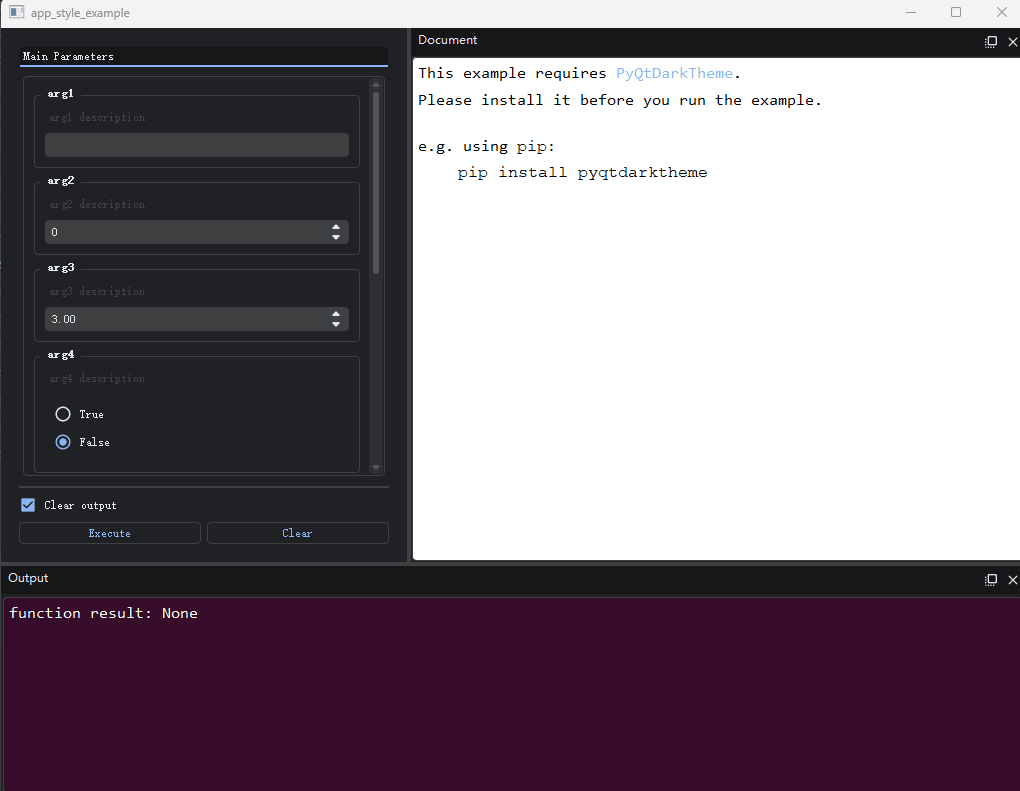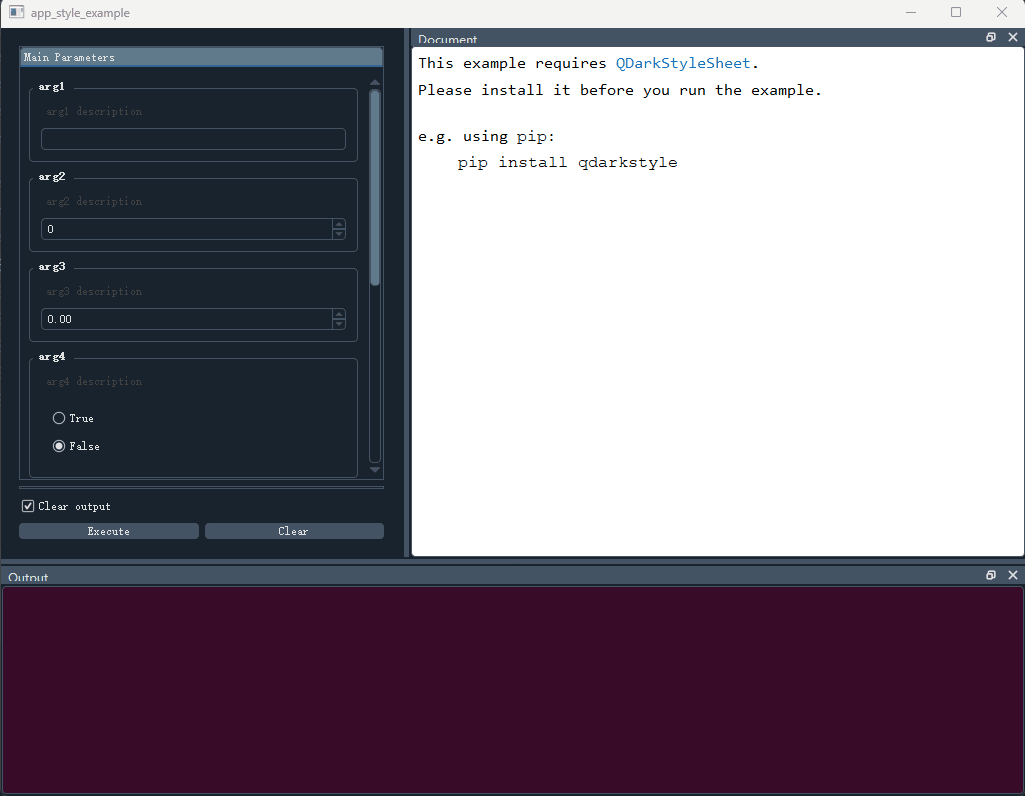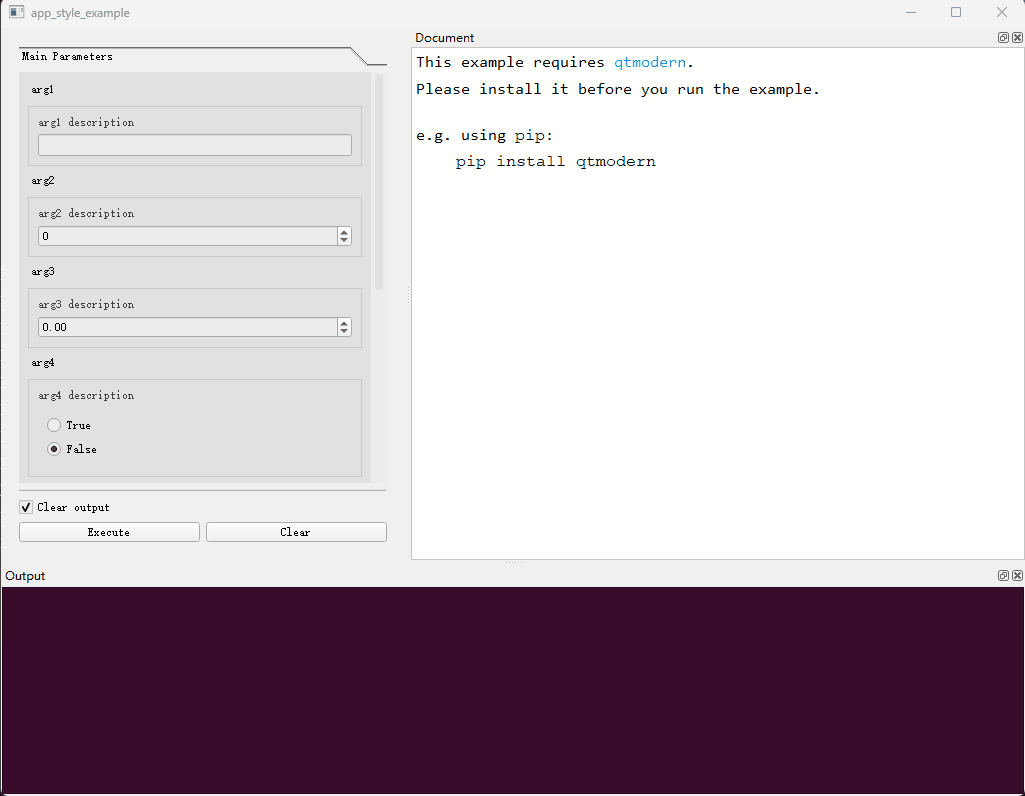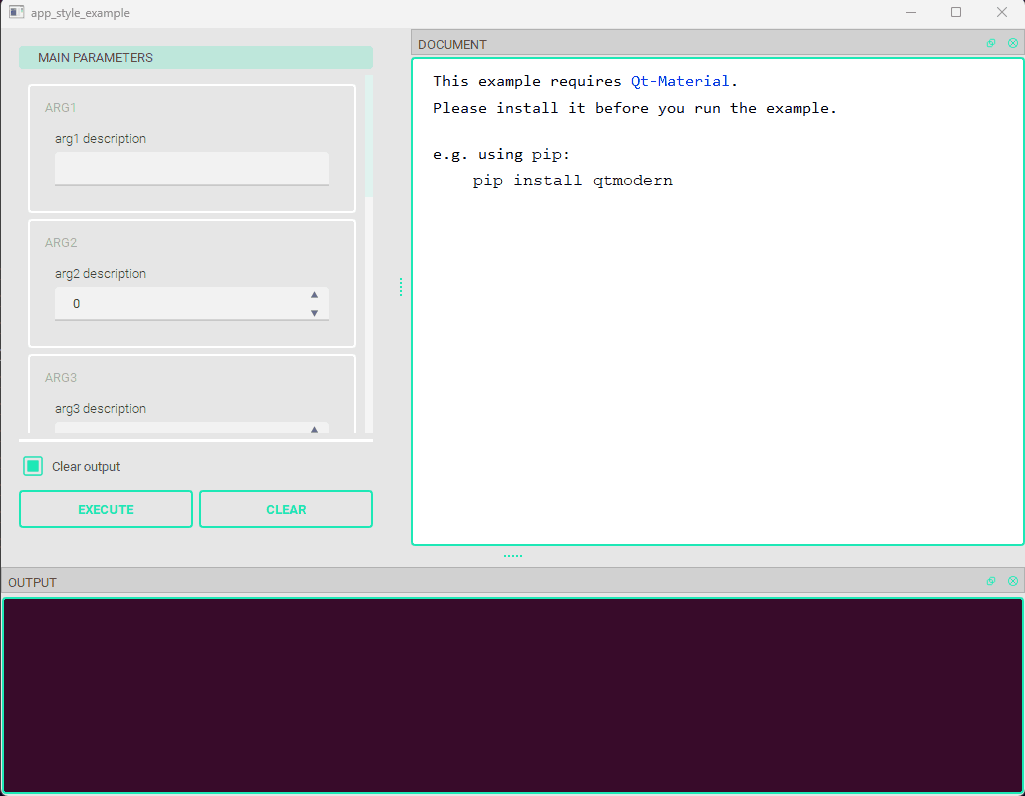界面美化
(一)概述
PyGUIAdapter底层使用Qt构建GUI, 所以一些适用于Qt的界面美化方法同样也适用于PyGUIAdapter,比如样式表以及第三方美化库。下面将分别介绍这两种界面美化的方法。
(二)使用样式表
开发者可以使用QT样式表(QSS)来自定义界面风格。有几种方法可以设置样式表:
1、设置全局样式表
GUIAdapter类的构造函数中有一个global_style参数,用于设置全局样式表,开发者可以把全局样式表的内容或者一个以全局样式表内容为返回值的函数传递给该参数。
(1)传入样式表内容
import os.path
from datetime import datetime
from pyguiadapter import utils
from pyguiadapter.adapter import GUIAdapter
from pyguiadapter.extend_types import text_t
def app_style_example(
arg1: str, arg2: int, arg3: float, arg4: bool, arg5: text_t, arg6: datetime
):
"""
This example shows how to apply a global stylesheet to the application.
First, read the stylesheet from a qss file. In this example, [Ubuntu.qss](https://github.com/GTRONICK/QSS/blob/master/Ubuntu.qss)
will be used. This qss file is from GTRONICK's [QSS](https://github.com/GTRONICK/QSS) repo.
Then, pass the qss content to the GUIAdapter constructor's **global_style** argument.
"""
pass
if __name__ == "__main__":
QSS_FILE = os.path.join(os.path.dirname(__file__), "Ubuntu.qss")
global_stylesheet = utils.read_text_file(QSS_FILE)
adapter = GUIAdapter(global_stylesheet=global_stylesheet)
adapter.add(app_style_example)
adapter.run()
(2)传入样式表加载函数
import os.path
from datetime import datetime
from pyguiadapter import utils
from pyguiadapter.adapter import GUIAdapter
from pyguiadapter.extend_types import text_t
def app_style_example(
arg1: str, arg2: int, arg3: float, arg4: bool, arg5: text_t, arg6: datetime
):
"""
This example shows how to apply a global stylesheet to the application.
First, read the stylesheet from a qss file. In this example, [Ubuntu.qss](https://github.com/GTRONICK/QSS/blob/master/Ubuntu.qss)
will be used. This qss file is from GTRONICK's [QSS](https://github.com/GTRONICK/QSS) repo.
Then, pass the qss content to the GUIAdapter constructor's **global_style** argument.
"""
pass
if __name__ == "__main__":
QSS_FILE = os.path.join(os.path.dirname(__file__), "Ubuntu.qss")
def load_stylesheet() -> str:
"""
This function will be called after the QApplication instance being created
"""
return utils.read_text_file(QSS_FILE)
adapter = GUIAdapter(global_stylesheet=load_stylesheet)
adapter.add(app_style_example)
adapter.run()
2、手动加载并设置样式表
GUIAdapter启动时内部将创建QApplication实例。将回调on_app_start()方法,开发者可以在该回调函数中访问到当前QApplication对象,之后便可调用其setStyleSheet()方法设置样式表。
import os.path
from datetime import datetime
from qtpy.QtWidgets import QApplication
from pyguiadapter import utils
from pyguiadapter.adapter import GUIAdapter
from pyguiadapter.extend_types import text_t
def app_style_example(
arg1: str, arg2: int, arg3: float, arg4: bool, arg5: text_t, arg6: datetime
):
"""
This example shows how to apply a global stylesheet to the application.
In this example, [Ubuntu.qss](https://github.com/GTRONICK/QSS/blob/master/Ubuntu.qss)
will be used. This qss file is from GTRONICK's [QSS](https://github.com/GTRONICK/QSS) repo.
The QSS will be set in **on_app_start()** callback.
"""
pass
if __name__ == "__main__":
QSS_FILE = os.path.join(os.path.dirname(__file__), "Ubuntu.qss")
def on_app_start(app: QApplication):
assert isinstance(app, QApplication)
print("on_app_start")
qss = utils.read_text_file(QSS_FILE)
app.setStyleSheet(qss)
print("app style applied")
adapter = GUIAdapter(on_app_start=on_app_start)
adapter.add(app_style_example)
adapter.run()
(三)使用第三方库
PyGUIAdapter内部使用qtpy创建用户界面,因此可以无缝接入一些支持qtpy的第三方美化库。下面是一些初步测试可用第三方库。
1、PyQtDarkTheme
运行示例代码,需要先安装
PyQtDarkTheme:
"""
This example requires PyQtDarkTheme. Please install it before you run this example.
"""
from datetime import datetime
from pyguiadapter.adapter import GUIAdapter
from pyguiadapter.extend_types import text_t
def app_style_example(
arg1: str, arg2: int, arg3: float, arg4: bool, arg5: text_t, arg6: datetime
):
"""
This example requires [PyQtDarkTheme](https://github.com/5yutan5/PyQtDarkTheme).
Please install it before you run the example.
<br />
e.g. using `pip`:
> `pip install pyqtdarktheme`
@param arg1: arg1 description
@param arg2: arg2 description
@param arg3: arg3 description
@param arg4: arg4 description
@param arg5: arg5 description
@param arg6: arg6 description
@return:
"""
pass
if __name__ == "__main__":
import qdarktheme
def on_app_start(app):
# this will be called after the instantiation of QApplication.
print("app started")
qdarktheme.setup_theme("dark")
adapter = GUIAdapter(on_app_start=on_app_start)
adapter.add(app_style_example)
adapter.run()
2、QDarkStyleSheet
运行示例代码,需要先安装
QDarkStyleSheet,比如:
from datetime import datetime
from qtpy.QtWidgets import QApplication
from pyguiadapter.adapter import GUIAdapter
from pyguiadapter.extend_types import text_t
def app_style_example(
arg1: str, arg2: int, arg3: float, arg4: bool, arg5: text_t, arg6: datetime
):
"""
This example requires [QDarkStyleSheet](https://github.com/ColinDuquesnoy/QDarkStyleSheet).
Please install it before you run the example.
<br />
e.g. using `pip`:
> `pip install qdarkstyle`
@param arg1: arg1 description
@param arg2: arg2 description
@param arg3: arg3 description
@param arg4: arg4 description
@param arg5: arg5 description
@param arg6: arg6 description
@return:
@params
[arg6]
calendar_popup = true
@end
"""
pass
if __name__ == "__main__":
import qdarkstyle
def on_app_start(app: QApplication):
# this will be called after the instantiation of QApplication.
print("app started")
app.setStyleSheet(qdarkstyle.load_stylesheet())
adapter = GUIAdapter(on_app_start=on_app_start)
adapter.add(app_style_example)
adapter.run()
3、qtmodern
运行示例代码,需要先安装
qtmodern,比如:
from datetime import datetime
from qtpy.QtWidgets import QApplication
from pyguiadapter.adapter import GUIAdapter
from pyguiadapter.extend_types import text_t
def app_style_example(
arg1: str, arg2: int, arg3: float, arg4: bool, arg5: text_t, arg6: datetime
):
"""
This example requires [qtmodern](https://github.com/gmarull/qtmodern).
Please install it before you run the example.
<br />
e.g. using `pip`:
> `pip install qtmodern`
@param arg1: arg1 description
@param arg2: arg2 description
@param arg3: arg3 description
@param arg4: arg4 description
@param arg5: arg5 description
@param arg6: arg6 description
@return:
@params
[arg6]
calendar_popup = true
@end
"""
pass
if __name__ == "__main__":
import qtmodern.styles
def on_app_start(app: QApplication):
# this will be called after the instantiation of QApplication.
print("app started")
qtmodern.styles.light(app)
adapter = GUIAdapter(on_app_start=on_app_start)
adapter.add(app_style_example)
adapter.run()
4、Qt-Material
运行示例代码,需要先安装
Qt-Material,比如:
from datetime import datetime
from qtpy.QtWidgets import QApplication
from pyguiadapter.adapter import GUIAdapter
from pyguiadapter.extend_types import text_t, json_obj_t
def app_style_example(
arg1: str,
arg2: int,
arg3: float,
arg4: bool,
arg5: text_t,
arg6: datetime,
arg7: json_obj_t,
):
"""
This example requires [Qt-Material](https://github.com/UN-GCPDS/qt-material).
Please install it before you run the example.
<br />
e.g. using `pip`:
> `pip install qt-material`
@param arg1: arg1 description
@param arg2: arg2 description
@param arg3: arg3 description
@param arg4: arg4 description
@param arg5: arg5 description
@param arg6: arg6 description
@param arg7: arg7 description
@return:
@params
[arg6]
calendar_popup = true
@end
"""
pass
if __name__ == "__main__":
import qt_material
def on_app_start(app: QApplication):
# this will be called after the instantiation of QApplication.
print("app started")
qt_material.apply_stylesheet(app, theme="light_teal.xml")
adapter = GUIAdapter(on_app_start=on_app_start)
adapter.add(app_style_example)
adapter.run()
